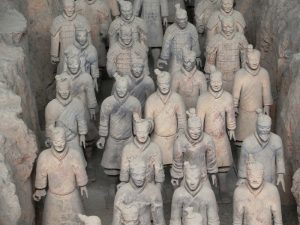45 Qin Dynasty, The Great Wall, & Legalism
Shi Huangdi and the Qin Dynasty
The seven separate states fought each other for supremacy—which would grant them the mandate—throughout the era known as the Warring States Period (c. 481–221 BCE) but none could gain the advantage until the state of Qin (pronounced chin), under their king Ying Zheng, adopted a policy of total war and defeated the others. Ying then proclaimed himself Shi Huangdi (First Emperor
) and founded the Qin Dynasty in 221 BCE. At first, Shi Huangdi seemed to observe the Mandate of Heaven in caring for the people but became increasingly oppressive and tyrannical. By 213 BCE, people were being conscripted to work on his projects and essentially serve as slave laborers while freedom of speech was banned and any books other than those on Qin history, Legalism, or practical matters were burned.(9)
Shi Huangdi’s early reign focused on consolidating his power and appealing to the lower classes through initiatives such as building projects and construction of roads and canals, which made trade and travel easier and provided employment. Among his accomplishments were an early version of the Great Wall of China, the Grand Canal, and his enormous tomb guarded by the terracotta warriors.(10)
The Great Wall and Legalism

In order to protect his people from invasion by the nomadic Xiongnu of the north, Shi Huangdi decreed a wall built along the country’s borders. The stones of the walls which used to divide the separate states were initially used for this purpose and would form the first version of what would later become the Great Wall of China. He ordered all the states to surrender their weapons which he had melted down and made into artworks and statues celebrating the new state. Canal work was also decreed, which at first provided employment just as the Great Wall did, resulting in an early version of the Grand Canal.
The people’s lives under the Qin became harsh, narrow, and more uncertain than they had been during the Warring States Period because government officials could take anyone they wanted to work on the emperor’s projects, no matter their social class or occupation. Only the emperor’s men were allowed weapons so there was no armed resistance possible and, even if arms had been available, Shi Huangdi’s network of spies, secret police, and informants would have revealed a plot before it had a chance to be put into action.(10)

From 213 BCE on, Shi Huangdi became increasingly paranoid and erratic. Three attempts were made to assassinate him, which only increased his anxiety and encouraged even more restrictive policies. He changed the room he slept in each night, was always armed, and increased his security. His fear of imminent death encouraged an obsession with immortality, and he tasked trusted officials with finding him some means to live forever and went on journeys to areas where an elixir seemed promising. At the same time, he devoted more resources to the effort of building his grand tomb, as large as a city, and complete with its own army, from which he planned to continue his reign in the afterlife.
Although the Qin Dynasty is often referenced positively as the first political entity to unite China and give it the name it is known by in the West, the reign of Shi Huangdi and his inept son and grandson were a dark time for the people who were impoverished, brutalized, and kidnapped from their homes to serve the ego of the emperor. It is a telling detail that the Qin Dynasty is the shortest, only 15 years, in the history of Imperial China owing to its brutality and blatant rejection of the central value of the Mandate of Heaven that a ruler care for the people above any personal considerations.(10)

